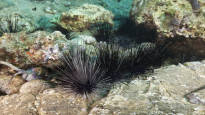Sea urchins experience a quick and violent death, say Israeli researchers. So far, there is no certainty about the cause of the mass deaths.
Coral reefs in the Red Sea are at risk due to mass die-offs of sea urchins, say Israeli scientists.
The sea urchin species Diadema setosum is rapidly disappearing from the Red Sea’s Gulf of Aqaba.
There is no certainty as to the cause of the mass death, but researchers have ruled out, for example, pollution and poisons. They suspect that it is a rapidly spreading epidemic, the cause of which has not yet been identified.
Sea urchins experience a quick and violent death, says the marine biologist who led the study.
– A healthy individual loses a huge amount of tissue in a couple of days, and only the skeleton remains, says the marine biologist Oren Bronstein from Tel Aviv University.
Sea urchin deaths have already been reported in Greece and Turkey. Since then, the mass deaths have spread to the Red Sea.
In the Caribbean Sea, a similar mass death of sea urchins has been caused by a single-celled parasite. Israeli researchers consider it possible that the pathogen of the Mediterranean and the Red Sea is similar.
“Sea urchins are gardeners of coral reefs”
Sea urchins are vital to corals. They use algae for food, which would otherwise block the passage of light and suffocate reefs.
Without sea urchins, corals cannot cope with algae, says the researcher.
– Sea urchins are grazers and gardeners of coral reefs, says Bronstein.
– They are ecological key players. So they don’t just happen to live on coral reefs, they are vital to the well-being of reefs.
According to Bronstein, the spread of the epidemic in the Red Sea can no longer be stopped. Now, however, one could still try to isolate a healthy sea urchin population, which could later be returned back to the sea.
Israeli researchers hope that the authorities will act quickly to save sea urchins and coral reefs.
The Gulf of Aqaba in the Red Sea is located between Egypt’s Sinai Peninsula and Saudi Arabia. In the bottom of the Gulf of Aqaba, for example, Eilat in Israel and Aqaba in Jordan are popular diving destinations.
Corals are therefore also important for tourism in the region.
Sources: Reuters, AP
